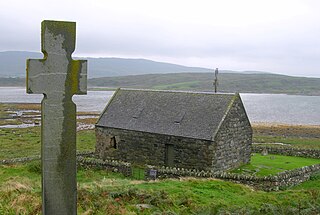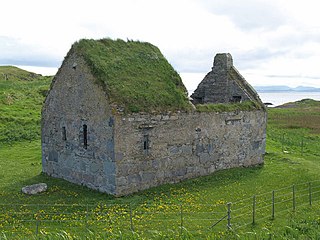See also
- Keill Randor, fictional character in Douglas Hill's The Last Legionary book series
- Keeill, a chapel on the Isle of Man
- Keills Chapel, Scotland
- Keil (disambiguation)
Keill is a Scottish family name that may refer to:
Johnson is a surname of English, Scottish origin. The name itself is a patronym of the given name John, literally meaning "son of John". The name John derives from Latin Johannes, which is derived through Greek Ἰωάννης Iōannēs from Hebrew יוחנן Yohanan, meaning "Yahweh has favoured". The name has been extremely popular in Europe since the Christian era as a result of it being given to St John the Baptist, St John the Evangelist and nearly one thousand other Christian saints. Johnson is the second most common in the United States and 154th most common in the world. As a Scottish family name, Johnson is occasionally a variation of Johnston, a habitational name.

Knapdale forms a rural district of Argyll and Bute in the Scottish Highlands, adjoining Kintyre to the south, and divided from the rest of Argyll to the north by the Crinan Canal. It includes two parishes, North Knapdale and South Knapdale. The area is bounded by sea to the east and west, whilst the sea loch of West Loch Tarbert almost completely cuts off the area from Kintyre to the south. The name is derived from two Gaelic elements: Cnap meaning hill and Dall meaning field.
Souter is a Scottish surname derived from the Scots language term for a shoemaker, and may refer to:
Moros is the personification of impending doom and destruction in Greek mythology.
Cowie may refer to:
Gow is a Scottish surname. The name is derived from the Gaelic gobha, meaning 'smith'. The name is represented in Scottish Gaelic as Gobha.

Keills Chapel is a small chapel located in the west Highlands, Scotland, near the village of Tayvallich, Knapdale.

Kilmory Knap Chapel is a 13th-century Christian chapel, located at the tiny hamlet of Kilmory, in Knapdale, Argyll and Bute, on the west coast of Scotland.
MacManus is a family name that may refer to:
Marwick is a Scottish surname, that may refer to:
John Keill FRS was a Scottish mathematician, natural philosopher, and cryptographer who was an important defender of Isaac Newton.
The surnames MacGavin and McGavin are Scottish surnames, which are possibly variations of the surnames McGowan and MacGowan, which are Anglicised forms of the Scottish Gaelic MacGobhann and Irish Gaelic Mac Gabhann, meaning "son of the smith". When the surname MacGavin and McGavin originate from Glasgow and Moray, they can be represented in Scottish Gaelic as Mac a' Ghobhainn.
Mac a' Ghobhainn is a Scottish Gaelic surname, meaning "son of the smith". The surname is used as a Scottish Gaelic form of several English-language surnames: MacGowan, and McGowan; Smith; and in Glasgow and Moray, the surnames MacGavin and McGavin. The feminine form of Mac a' Ghobhainn is Nic a' Ghobhainn.
Ferrier is a surname of European origin.
McMenamin is an Irish surname. In ancient Gaelic it was shorter, Meanma, a word meaning courageous or high spirited. It originated in Co. Donegal in the 13th century and the Meanma’s were a warrior branch of the O'Donnells of Tyrconnell (Donegal), who were the "chieftains of Fanad" a large territory in Donegal. Notable people with the surname include:
Souttar may refer to:

Eilean Mòr is one of the MacCormaig Isles situated near the entrance to Loch Sween in the Sound of Jura, Argyll and Bute, Scotland. Eilean Mòr is uninhabited.
Carry is an English and German feminine given name, nickname and surname, which serves as an alternate form of Carrie and a diminutive form of several names including Carola, Carol, Carlotta, Carolin, Carolina and Caroline. Notable people referred to by this name include the following:
Calle is a Danish, Finnish, Norwegian and Swedish masculine given name, nickname and surname that is a diminutive form of Carl and Karl and an alternate form of Kalle. Calle is a surname with Spanish, English, Irish, Scottish, and German origins. Its Spanish origins are from the Spanish word calle, which means street and traces its origins back to Santander, Spain. a derive Notable people referred to by this name include the following: